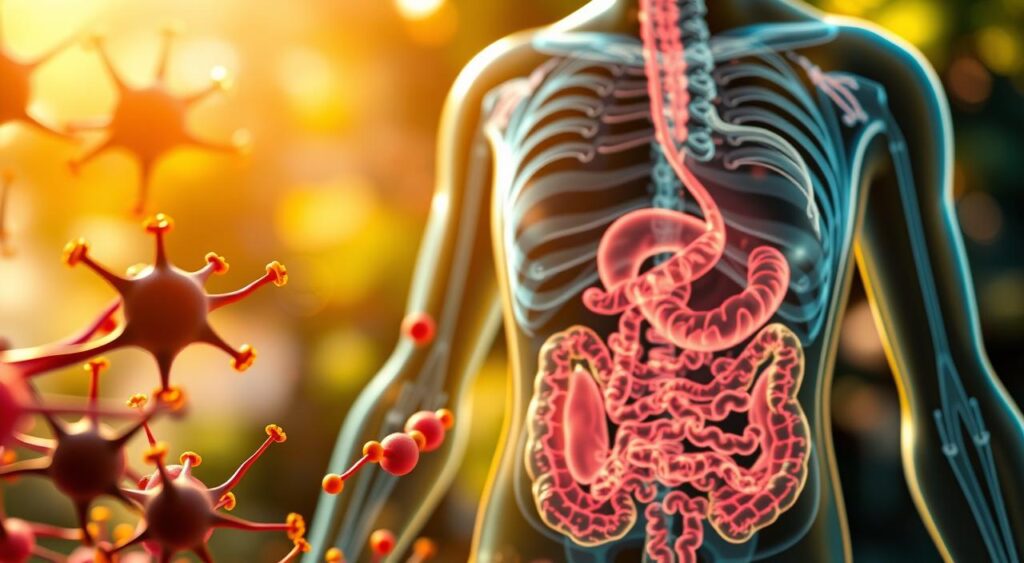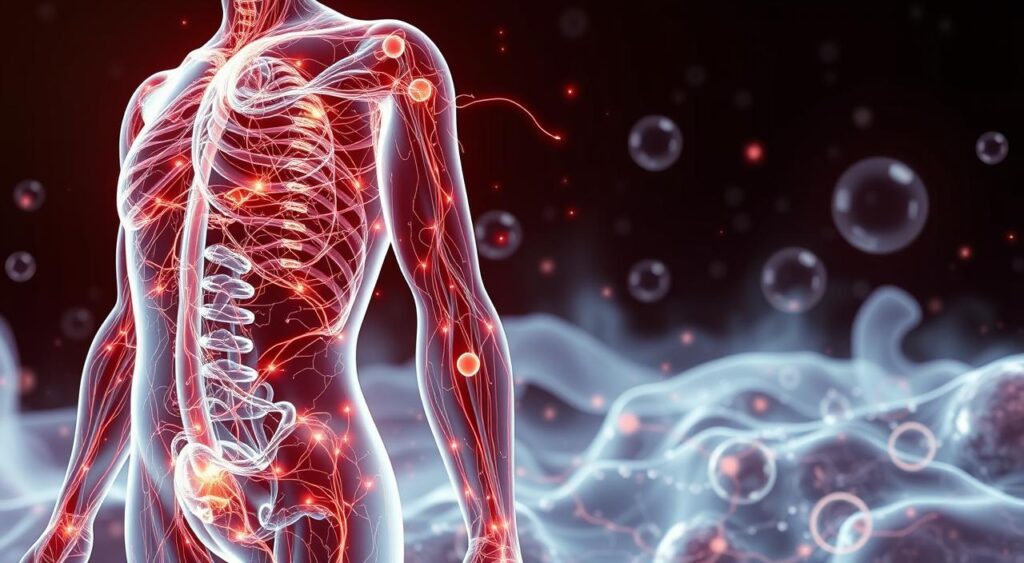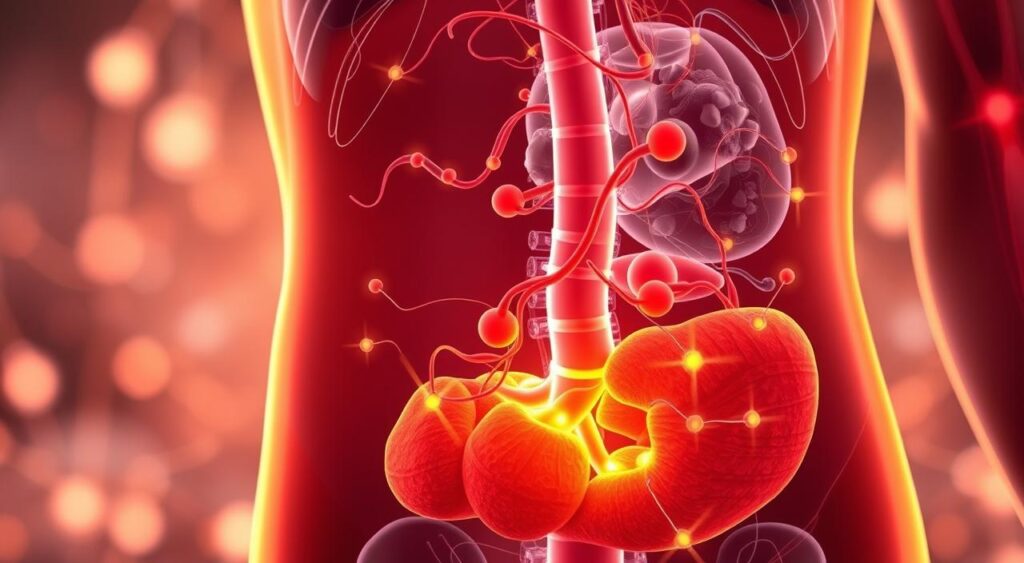Ever wondered why some people seem to lose weight easily while others struggle? It’s all about understanding metabolism and weight loss. Many think a slow metabolism is the main culprit, but is that true? In this article, we’ll explore the real connection between metabolism and weight loss.
We’ll also debunk common myths and share ways to boost your metabolism. You’ll learn how to increase your metabolism and burn fat more efficiently. Get ready to uncover the secrets of how to optimize your body’s fat-burning abilities!
Understanding Metabolism: The Basics
Metabolism is key to your body’s health, covering all chemical processes needed to live. It includes breaking down food into energy (catabolism) and building up cell parts for growth and repair (anabolism). How well these processes work affects your metabolic rate, which impacts metabolism and weight loss.
What is Metabolism?
Metabolism is the sum of all chemical reactions in your body. It shows how fast or slow your body uses energy. Knowing how metabolism works helps you make better choices about diet and exercise. Things like age, genetics, and body type also play a big role in your metabolic function.
How Metabolism Converts Food into Energy
Turning food into energy is a complex process. When you eat, your body breaks down carbs, fats, and proteins into simple units. These units are then used for energy or stored for later. Your metabolic rate shows how well your body does this. A higher rate means you burn calories better, helping with weight control.
Metabolism and Weight Loss: The Connection
Your metabolic rate is key to managing your weight. A high metabolic rate means you burn calories faster, helping you reach your weight loss goals. It’s important to know that lifestyle factors, like diet and exercise, also play a big role.
How Your Metabolic Rate Affects Weight Management
A high metabolic rate helps you burn more calories daily, making weight loss easier. But, a low metabolic rate can slow down your weight loss. While metabolism matters, lifestyle choices are more important, affecting up to 80% of weight changes.
Common Myths About Metabolism and Weight Gain
Many think a slow metabolism causes weight gain. But, this is only part of the story. Other factors are more important. Foods or supplements that claim to boost metabolism often don’t work well in the long run.

Factors Influencing Your Metabolism
Your metabolic rate is shaped by several factors, including muscle mass and age. Knowing these can help you manage your weight better.
The Role of Muscle Mass
Muscle mass is key to your metabolic rate. The more muscle you have, the more calories you burn, even when resting. This helps with weight loss. Men usually have more muscle than women, which is why they often have a higher metabolic rate.
The Impact of Age on Metabolic Rate
As you get older, your muscle mass goes down, which lowers your metabolic rate. Hormonal changes with age make losing weight harder. To stay healthy, you need to keep exercising and eating right.

Dietary Considerations for Boosting Metabolism
Your diet plays a big role in how well your metabolism works. Knowing how many calories you need helps you make good food choices. Eating the right amount of calories is key to staying at a healthy weight.
When you eat more calories than you burn, you gain weight. Finding the right balance between what you eat and how active you are is important.
Caloric Intake and Energy Balance
Managing your calorie intake is vital for metabolic health. A small calorie deficit can help you lose weight and keep your metabolism running well. Choose foods that are full of nutrients but not too many calories.
Understanding how much energy your body needs is part of achieving energy balance. Checking your eating habits regularly helps you reach your metabolism goals.
Foods That Enhance Metabolic Rate
Some foods can help boost your metabolic rate. Foods high in protein, like lean meats and fish, take more energy to digest. This can help speed up your metabolism.
Adding spices like chili peppers to your meals can also help burn more calories. A diet full of proteins, fats, and carbs helps your metabolism work better. Making smart food choices can help you burn fat and keep your energy up.

Physical Activity’s Role in Speeding Up Fat Burn
Regular physical activity is key for anyone wanting to boost their metabolism and burn fat. Different exercises can help increase your metabolic rate and support a healthier lifestyle.
Types of Exercise That Increase Metabolism
Cardio activities like running, cycling, and swimming are great for boosting metabolism. They raise your heart rate, making your body burn more energy. Strength training is also important because it builds muscle. Muscles need more energy than fat, so they help keep your metabolism high.
For the best results, mix both aerobic exercises and strength training into your routine.
The Importance of Nonexercise Activity Thermogenesis (NEAT)
Structured exercise is important, but don’t overlook the role of nonexercise activity thermogenesis (NEAT). This includes all the small movements you make every day, like walking to work or fidgeting. These actions add up and help you burn more calories daily.
Even small increases in nonstructured activity can help you stay healthy and balanced. To learn more about exercise and weight loss, check out this source.

Medical Conditions and Their Effect on Metabolism
Your metabolism is key to how well your body burns calories and manages weight. Some medical conditions can really slow it down. Knowing how these conditions affect your metabolism can help you spot issues that might stop you from losing weight.
Conditions That Slow Metabolism
Several medical conditions can slow down your metabolism, making it harder to lose weight. Here are some common ones:
- Hypothyroidism: This happens when your thyroid gland doesn’t make enough hormones. It slows down your metabolic function.
- Cushing’s Syndrome: This is when you have too much cortisol. It can cause weight gain and change how your body uses energy.
- Hormonal Imbalances: Hormone changes can mess with your metabolism. They can affect your energy and weight.
When to Consult a Healthcare Provider
If you’re not seeing results from your lifestyle changes, it’s time to see a doctor. They can find out if any medical conditions are slowing your metabolism. They’ll also give you a plan that fits your needs, helping you reach your weight loss goals.
Weight Loss Tips for Boosting Metabolism
To boost metabolism and lose weight, mix diet changes with exercise. Some strategies can help you lose weight quickly and stay healthy.
Strategies for Effective Weight Loss
Eating more protein can help burn calories. Foods like lean meats, beans, and dairy need more energy to digest. This boosts your metabolism.
Adding fiber from fruits, veggies, and whole grains makes you feel full. This helps control how many calories you eat. Drinking enough water also helps your metabolism and weight management.
Long-term Changes for Sustainable Results
For lasting weight loss, make lifestyle changes, not quick fixes. Aim for slow weight loss to keep your body healthy. Setting achievable goals and making a plan keeps you motivated.
Regular workouts, like cardio and strength training, boost metabolism. They support your weight loss journey.
Common Misconceptions About Supplements and Metabolism
Many people look for supplements to boost their metabolism for quick weight loss. But, most of these products don’t have scientific backing and can cause side effects. It’s key to understand how metabolism works and its role in weight loss to make smart choices about supplements.
The Truth About Metabolism-Boosting Supplements
The FDA doesn’t check if supplements work or are safe before they hit the market. Many supplements claim to boost metabolism but often don’t deliver long-term results. Instead, focus on lasting changes through diet and exercise. For more on metabolism myths, check out this resource.
Safe Alternatives to Consider
Instead of supplements, try natural ways to boost your metabolism. Being more active, like through strength training, can help. Eating balanced meals with whole foods also supports your metabolism and weight loss.
Always talk to a healthcare expert before starting any new supplements. A personalized plan can help you reach your metabolism and weight loss goals safely and effectively.
Conclusion
Understanding how metabolism and weight loss work is key to losing fat and staying healthy. Your lifestyle, like diet and exercise, is just as important as your metabolic rate. Knowing this lets you take steps to boost your metabolism and use effective weight loss tips.
Starting a healthier metabolism journey is easy. Just focus on eating well and staying active. These habits help your body stay healthy as you get older. They keep your metabolism working well and boost your health.
It’s all about a holistic approach. By changing your mindset and using the right strategies, losing weight can be a positive experience. Every effort you make today helps you towards a healthier future. It makes every step you take worth it.



